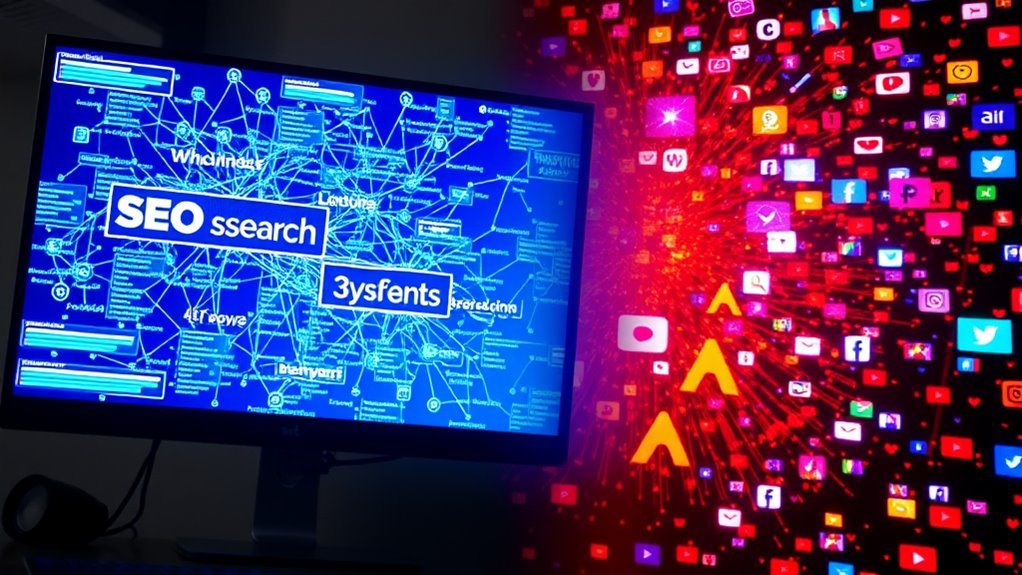In 2025, both SEO and social algorithms play crucial roles in driving traffic, but their impact varies based on your goals. SEO offers long-term, intent-driven search traffic through optimized, high-quality content, while social algorithms boost quick engagement and brand awareness with personalized feeds and engaging posts. To maximize your reach, you need a strategic mix of both. If you want to discover how to balance these approaches effectively, explore the insights ahead.
Key Takeaways
- SEO generates sustained, long-term organic traffic by targeting search intent and ranking high in search engines.
- Social algorithms deliver quick boosts in visibility through personalized feeds and engaging content like videos and stories.
- Combining both strategies maximizes overall traffic, leveraging SEO’s depth and social algorithms’ immediacy.
- Influencers enhance social reach and indirectly support SEO via backlinks and content sharing.
- In 2025, personalized content and AI-driven algorithms make both channels more competitive, emphasizing integrated strategies for optimal traffic.

In today’s digital landscape, understanding the differences between SEO and social algorithms is essential for maximizing your online presence. Both strategies influence how your content reaches your target audience, but they operate differently and serve distinct purposes. Recognizing these differences helps you craft more effective campaigns and drive more traffic to your site or profiles. When evaluating which method is more impactful in 2025, it’s crucial to consider the role of influencer impact and content personalization. These factors often determine how content is prioritized and discovered across platforms.
Understanding SEO and social algorithms helps optimize your content strategy for maximum impact in 2025.
SEO, or search engine optimization, focuses on optimizing your website and content to rank higher in search engine results. It’s a long-term strategy rooted in understanding what users are searching for and aligning your content accordingly. Good SEO practices include keyword research, quality backlinks, and technical site improvements. The goal is to ensure that when someone searches for relevant topics, your content appears at the top of the results, increasing organic traffic. In 2025, SEO continues to evolve with AI advancements, making keyword stuffing less effective and highlighting the importance of high-quality, user-focused content. Influencer impact still plays a role here, as influencers can generate backlinks or share your content, boosting your SEO efforts indirectly. Additionally, the integration of projector technology into content strategies can enhance multimedia presentations and user engagement.
Social algorithms, on the other hand, govern how content is distributed and prioritized on social media platforms like Instagram, TikTok, and Facebook. These algorithms are designed to maximize engagement, often by showing users content they’re most likely to interact with based on their past behavior. Content personalization is at the heart of these algorithms; they analyze your interactions, preferences, and even the time you spend on certain types of posts to tailor what appears in your feed. As a result, creating engaging, shareable content is vital for social media success. In 2025, social algorithms are becoming smarter, emphasizing video content, stories, and user interactions. Influencer impact is particularly significant here, as influencers can quickly amplify your message, leverage their followers, and help your content gain visibility despite the complexity of these algorithms.
Ultimately, both SEO and social algorithms drive traffic, but they do so through different mechanisms. SEO remains essential for capturing long-term, intent-driven searches, while social algorithms excel at quick engagement and brand awareness through personalized content feeds. Your best strategy combines both: leveraging SEO to attract organic search traffic and harnessing social media’s power to boost visibility through influencer collaborations and highly personalized content. By understanding and balancing these forces, you position yourself for increased traffic and sustained online growth in 2025.
Frequently Asked Questions
How Will Emerging AI Technologies Impact SEO and Social Algorithms?
Emerging AI technologies will considerably impact your strategies by enhancing AI integration and enabling more effective personalization strategies. You’ll see search engines and social algorithms become more intuitive, prioritizing user intent and personalized content. This means you need to focus on leveraging AI tools to optimize your content for better relevance and engagement, ensuring your traffic stays strong as these technologies evolve. Adapt quickly to stay ahead in this changing digital landscape.
What Role Do Privacy Regulations Play in Shaping Algorithm Changes?
You need to understand that privacy regulations substantially influence algorithm changes. They prioritize data privacy, limiting how platforms collect and use your information. This shift encourages transparency, making algorithms more accountable and understandable. As a result, you might see less invasive targeting, but also more emphasis on user consent. Staying informed about data privacy laws helps you adapt your strategies and leverage algorithm transparency to maximize your online presence effectively.
How Can Small Businesses Optimize for Both SEO and Social Media Algorithms?
Ah, the joy of chasing algorithms—who knew small businesses could become tech wizards? To optimize for both SEO and social media, you should focus on content repurposing to stretch your material across platforms and implement cross-platform strategies to maximize reach. By tailoring your content for each audience and leveraging trends, you’ll outsmart the algorithms and turn them into your marketing minions, not your masters.
Are There Specific Industries That Benefit More From SEO or Social Algorithms?
Some industries benefit more from industry-specific strategies that target niche market impacts. For example, B2B companies often thrive with SEO because they target specific keywords and long-tail searches. In contrast, fashion or entertainment brands might see more success through social algorithms, leveraging visual content and trending topics. Understanding your industry helps you tailor your approach, optimizing for platforms and strategies that maximize your reach and engagement.
How Do User Engagement Metrics Influence Algorithm Prioritization in 2025?
Imagine your content hanging in the balance—user engagement metrics hold the secret power. In 2025, algorithms heavily favor user signals, making content relevance essential. When you spark genuine interactions, likes, shares, and comments, you boost your visibility. The more your audience engages, the higher your content climbs. Stay focused on creating compelling, relevant content that resonates—because in this game, user signals decide your future traffic.
Conclusion
So, while SEO might seem like the obvious choice, social algorithms can quickly boost your traffic if you adapt fast. Don’t worry—mixing both strategies keeps you flexible and resilient against algorithm changes. You might think focusing on one is enough, but combining them offers the best of both worlds, ensuring steady growth. Stay adaptable, experiment often, and you’ll keep your traffic flowing no matter what the digital landscape throws at you.










